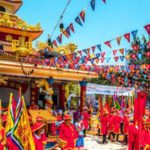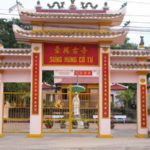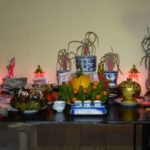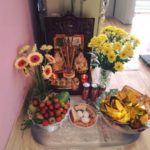Cúng quanh năm không bằng ngày Rằm tháng Giêng
Rằm tháng Giêng (also known as Tết Nguyên tiêu, Tết Thượng nguyên…) means the first full moon night of the Lunar New Year (“Nguyên” means first, “tiêu” means night). Rằm tháng Giêng is an important festive occasion for the Vietnamese people, as some believe it is the night Buddha descended, so everyone goes to the pagoda to pray for peace and good luck for their families.
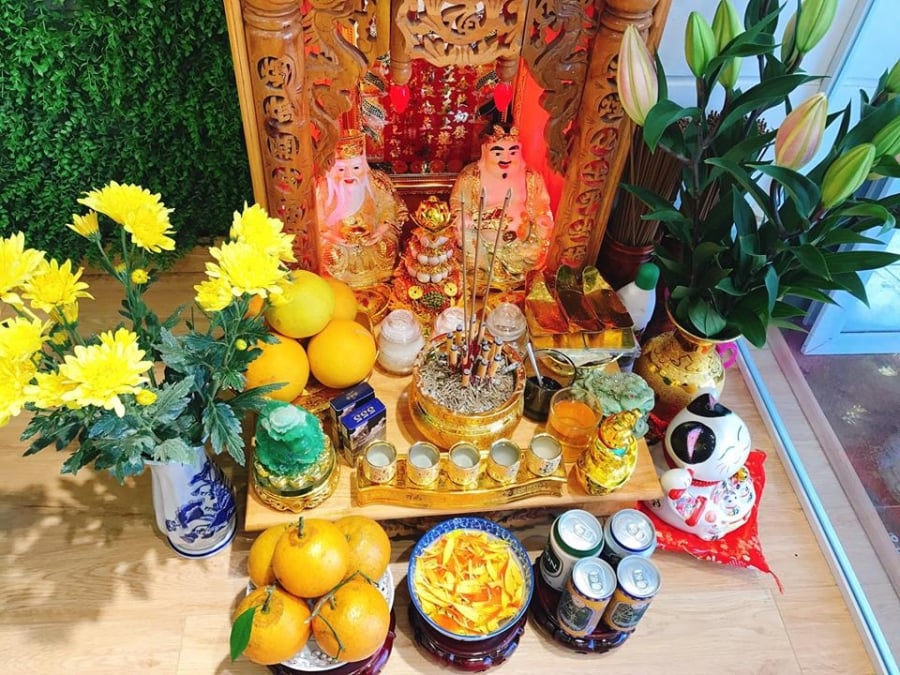
During Rằm tháng Giêng, farmers prepare to go to the fields, so they perform rituals to pray for favorable weather and abundant harvest. In folklore, it is said that “Cúng lễ quanh năm không bằng ngày Rằm tháng Giêng,” which means “Performing rituals on Rằm tháng Giêng is more significant than any other time of the year” – because during this period, the moon is full and the brightest at the beginning of the new year.
On that day, the Buddha bestows blessings and good fortune, bringing joy and happiness to all living beings. Folk belief states that performing sincere Buddha worship and properly conducting the rituals on Rằm tháng Giêng will bless the family with good health, peace, and prosperity. During this time, people pray for the prosperity and well-being of the country and its people, hoping that everything goes smoothly and as desired…
Avoid confusing vegetarian offerings and non-vegetarian offerings
The first thing to understand when performing rituals on Rằm tháng Giêng is to clearly distinguish between vegetarian offerings and non-vegetarian offerings. When making offerings to ancestors, the host can offer either vegetarian or non-vegetarian food depending on the circumstances and preparation time. However, for the Buddha’s altar, non-vegetarian offerings must not be made. Offerings on the Buddha’s altar mainly consist of various types of flowers, fruits, and naturally colored cakes and pastries. And of course, these offerings do not necessarily need to be made salty. Some information suggests that Rằm tháng Giêng should not involve offering pig heads, as it is forbidden to take lives.
However, this information is not clear, as vegetarian offerings to the Buddha do not use any meat or fish; meanwhile, for non-vegetarian offerings, it depends on the conditions and preferences of each family. Typically, families offer live roosters instead of pig heads. Pig heads are usually used in larger ceremonies of ancestral lineages. Rằm tháng Giêng can coincide with certain ancestral holidays, so using pig heads for offerings is not an issue.
Many families arrange the Buddha statue on the same altar as the ancestors and offer non-vegetarian offerings. This practice should also be avoided, as it does not conform to the spirit of worshiping on Rằm. Therefore, for families with such altar arrangements, they should place the non-vegetarian offerings below and place the fruits and cakes on top.
In addition, on Rằm tháng Giêng, many people also participate in ceremonies at temples and pagodas. Therefore, performing the non-vegetarian offerings at home allows the whole family to gather and pray together.
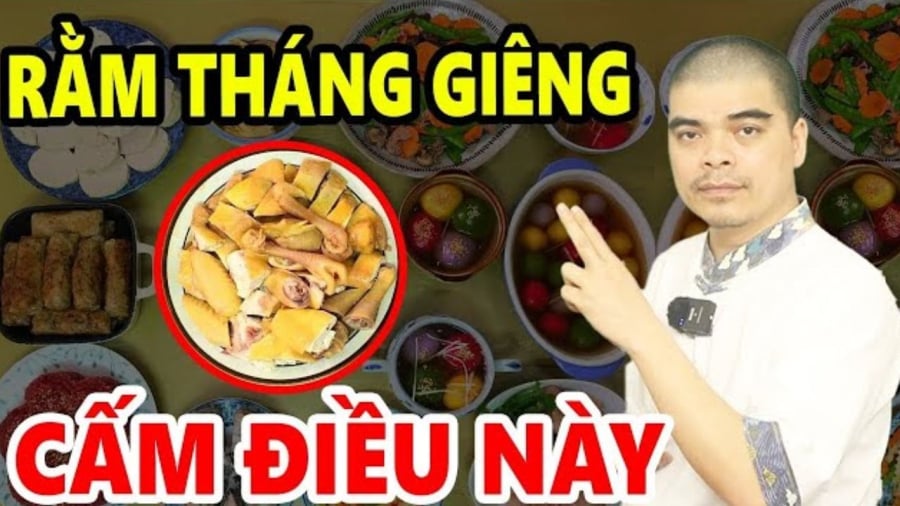
Avoid using damaged or rotten worship items
On Rằm tháng Giêng, offering worship represents a highly sacred meaning, where people express their sincerity and gratitude towards their ancestors and spiritual beings. Therefore, choosing worship items is an important step that should not be taken lightly. Particularly, using damaged or rotten worship items is absolutely to be avoided.
Rotten items not only fail to provide the necessary pure taste for a pure ritual, but they also demonstrate a lack of respect and care in expressing gratitude towards divine beings and ancestors. According to belief, every object placed on the altar must be fresh and of good quality, serving as evidence of filial piety and a desire to bring the best blessings to the family.
If accidentally using worship items that are no longer fresh or have been damaged, according to folklore, it not only diminishes the sanctity of the ceremony but can also bring misfortune for the upcoming year. Therefore, it is necessary to thoroughly check all worship items before placing them on the altar, ensuring that everything is fresh and clean, reflecting the trust and respect that humans want to devote to their superiors and the universe.
In addition, during Rằm tháng Giêng, fake money or dirty worship items should not be used; do not let dogs or cats touch the worship items or climb onto the altar during the offering. Moreover, during the offering, avoid wearing inappropriate or revealing attire, as well as women who are menstruating should not participate in the ceremony.
Avoid using fake flowers and fruits
When performing rituals on Rằm tháng Giêng, one of the things that the Vietnamese people particularly value is sincerity and heartfelt respect for ancestors and spiritual beings. Using fake flowers and fruits in the worship table not only lacks authenticity but also shows a lack of respect in performing these traditional rituals.
Real fruits bring natural flavor and liveliness, which not only demonstrate gratitude towards nature but also symbolize vitality, growth, and prosperity.
Furthermore, fake flowers and fruits can hardly replace the beauty and profound meaning that real fruits bring. While real fruits can be enjoyed after the ritual ends, fake fruits will not provide any practical value and can be seen as deceitful in the spiritual realm.
(Information provided for reference)
























